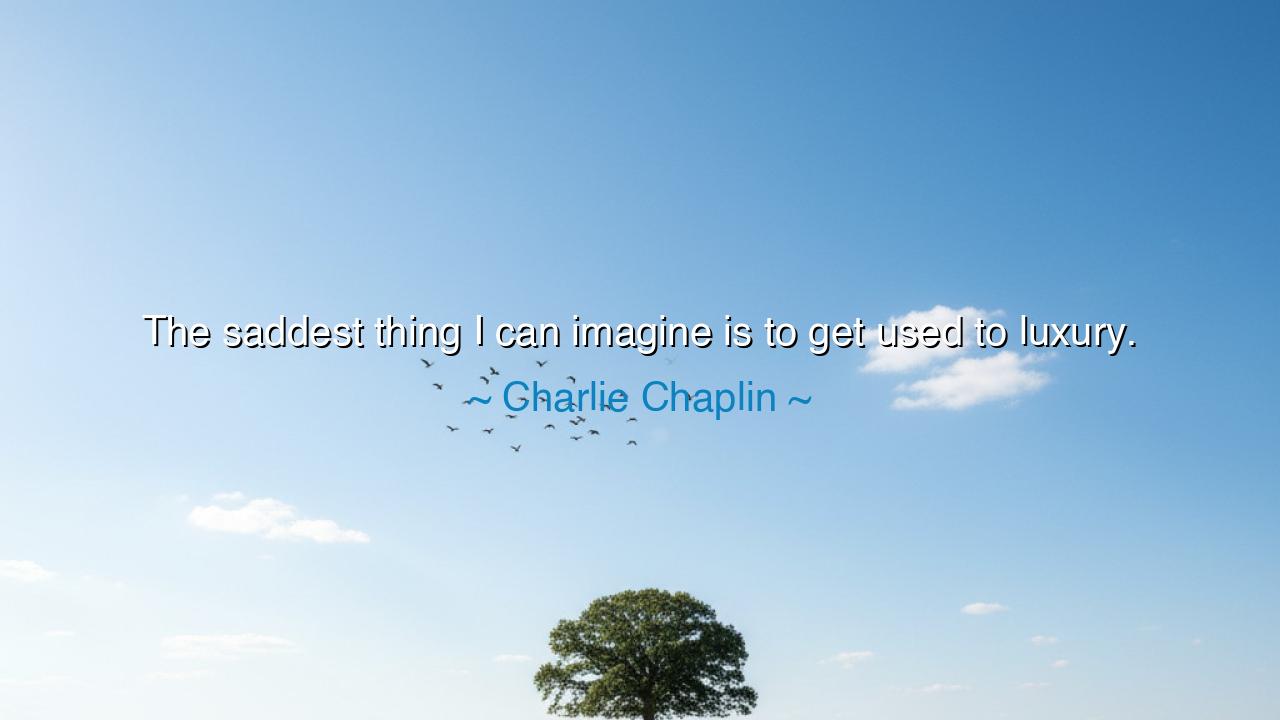
The saddest thing I can imagine is to get used to luxury.






“The saddest thing I can imagine is to get used to luxury.” Thus spoke Charlie Chaplin, the silent poet of motion and laughter — a man who once wandered the streets in hunger, yet rose to become the most beloved entertainer of his age. His words, born not of comfort but of remembrance, reveal a profound truth about the human spirit: that to become accustomed to luxury is to forget the sacredness of simplicity, to trade the wonder of living for the numbness of excess. In that quiet confession lies a warning, not against wealth itself, but against the slow death of gratitude and imagination that follows when comfort becomes our master.
Chaplin’s life was a journey from the gutter to the golden halls of fame. He knew the bite of hunger, the ache of cold, the loneliness of poverty. Yet even in hardship, his heart remained alive — sensitive to beauty, laughter, and the struggles of others. When success finally crowned him, he feared not ruin, but forgetfulness. For he knew that the poor man who dreams is richer in spirit than the rich man who feels nothing. To “get used to luxury” is to allow the soul to grow dull, to lose the sharpness that suffering and humility once gave it. Luxury, when it ceases to be a blessing and becomes a right, blinds us to the quiet miracles of life.
In the world of the ancients, wisdom often warned of this same danger. The Stoics taught that comfort breeds weakness, and that a man should train his soul to be content with little. They knew that the heart grows lazy when surrounded by abundance, just as a blade grows dull when left unused. Chaplin’s words echo their teachings, though spoken in the language of an artist rather than a philosopher. He reminds us that luxury is not evil — but to become accustomed to it, to let it silence gratitude, is to lose touch with life’s true pulse. The heart that cannot find joy in the simple is already impoverished, no matter how full its cup.
Consider the story of Siddhartha Gautama, the prince who became the Buddha. Surrounded by every comfort, he lived in palaces of music and gold, shielded from pain. Yet he felt a great emptiness within — the suffocating sorrow of one who has everything yet understands nothing. One day, he stepped beyond his palace gates and saw sickness, age, and death — and in that moment, his eyes were opened. He left behind all luxury, seeking instead the truth of the human condition. In losing comfort, he gained clarity; in embracing simplicity, he found enlightenment. So too, Chaplin’s warning calls us to guard against the slumber of indulgence, to remain awake to the real — to the fragile, aching beauty of life itself.
For luxury, once familiar, breeds blindness. It whispers that we deserve ease, that struggle is beneath us, that compassion is for those who have not yet risen. It robs us of wonder — the awe of seeing sunlight on water, the taste of bread after hunger, the warmth of laughter after tears. To get used to luxury is to forget that joy is not found in possession, but in perception. It is to grow deaf to the music of the ordinary, and in that deafness, to lose our humanity.
Yet there is another way. We need not reject the blessings of comfort, but we must hold them lightly. Let us dwell among them as travelers, not prisoners. Let us remember hunger even when the table is full, and cold even when the fire burns bright. To remain humble amid abundance — that is the art of the awakened heart. As Chaplin himself lived, one must balance wealth with compassion, laughter with awareness, and art with humility.
The lesson, then, is this: never let comfort dull your soul. Seek beauty not in gold, but in gratitude. Keep your senses sharp, your heart open, your spirit restless. Spend time among the simple, the honest, the struggling, for they will remind you what it means to be alive. Give more than you take, and when you rise high, look always to where you came from. Luxury may surround you, but never let it own you.
So remember, my child of both earth and light: comfort is fleeting, but awareness is eternal. Guard your spark of humility, as Chaplin guarded his, for it is the source of your humanity. Rejoice in the small, cherish the plain, and keep your eyes clear of the fog of indulgence. For the richest life is not the one wrapped in luxury, but the one that still trembles in wonder at the simple, miraculous gift of being alive.






AAdministratorAdministrator
Welcome, honored guests. Please leave a comment, we will respond soon